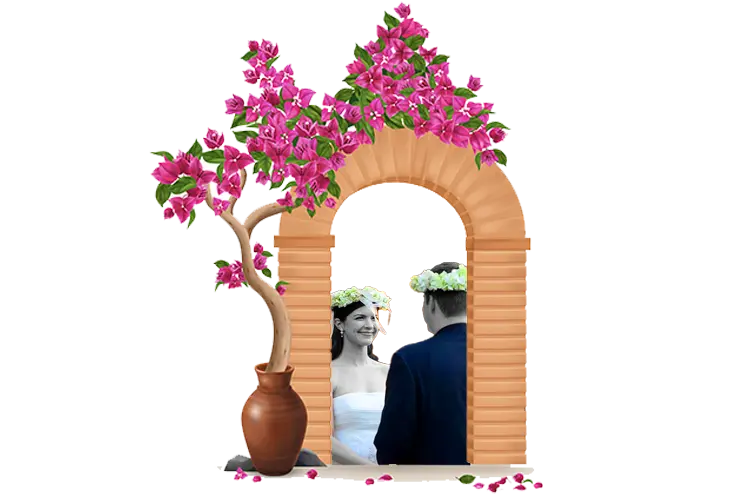
Check out any list of destination wedding hot spots, and you’re sure to find Greece. It’s easy to see why — picture-perfect cave houses in Santorini, white sand beaches in Corfu, ancient monuments in Delphi, and the list goes on.
However, whether you’re planning to get married in Greece or just want to incorporate Greek wedding traditions into your ceremony, there are things you need to know. From pre-wedding rituals and good luck charms to hearty dishes and lively dances, here’s a quick guide to Hellenic nuptials.

Even if you’ve never been to Greece or attended a Greek wedding, you probably know more than you realize, thanks to popular movies like My Big Fat Greek Wedding and Mamma Mia! These films got some things right, but there’s plenty they didn’t show. For instance, they ignored all kinds of popular Greek pre-wedding traditions.
In Greek Orthodox tradition, couples choose their wedding date based on the Church calendar. Some dates are lucky, while others must be avoided.
January and June are lucky months. Ancient Greek wedding traditions associate January with Hera, the goddess of marriage and fertility. Similarly, during the height of the Roman empire, the Romans translated Hera’s name to Juno and dedicated the sixth month of the year to the goddess. As a result, June also became an auspicious month for marriage.
On the other side of the coin, many dates are off-limits, according to church traditions. These include:
The night before the wedding ceremony, friends and family members gather at the couple’s home to prepare their bed. Although this tradition sounds domestic, it has nothing to do with changing the sheets or fluffing the pillows. Rather, this ritual (which some consider outdated) is all about blessing the soon-to-be-weds.
It involves throwing coins, flower petals, rice, and koufeta (Jordan almonds) into the bed to bless the couple with love and prosperity. Another aspect of the tradition involves rolling a baby on the bed to bless the couple with fertility. According to superstition, the newlywed’s first baby will be the same sex as the baby rolled on the marriage bed.
On the wedding morning, the best man (koumbaro) shaves the groom. The gesture symbolizes trust. Following the shave, the koumbaro and other close friends help the groom dress.
As the maid of honor (koumbara) helps the bride prepare for the ceremony, she helps the bride write the names of single women on the bottoms of her shoes. According to tradition, the women whose names wear off by the end of the reception will soon marry.

The Irish have four-leaf clovers, Americans have wishbones, and Greeks have…lumps of sugar.
Greek culture is full of lucky charms. Here are some of the most notable ones you’ll see at weddings:

Marriage is one of the seven Sacraments of the Greek Orthodox Church, and there are two parts of the Greek wedding ceremony: the Service of Betrothal and the Service of the Crowning. The Service of the Crowning is spread over five parts: prayers, crowning, scripture readings, drinking from the Common Cup, and the Dance of Isaiah. To honor the Holy Trinity, rituals occur three times.
Here’s what to expect from each part of the ceremony.
The Service of the Betrothal starts with the priest blessing the wedding rings three times. He then announces the bride and groom betrothed in the name of the Holy Trinity. Next, the priest places the rings on each person’s right hand. Finally, the koumbaro swaps the rings between the couple three times. This gesture symbolizes the couple’s intertwined lives.
The lighting of the candles follows. The bride and groom hold a lit candle to show their willingness to receive Christ.
The Crowning comes next. This tradition involves placing wedding crowns on both the bride and groom’s heads. Then, the koumbaro intertwines the ribbon, connecting them three times to show the couple’s union.
After the crowning, the priest reads two scriptures. The first is from St. Paul to the Ephesians (5:20-33) and describes love and respect, while the second is by St. John (2:1-12). It talks about Christ’s miracle of changing water into wine at the wedding of Cana in Galilee. To highlight this miracle, the couple drinks wine from the Common Cup.
Lastly, the couple engages in the Dance of Isaiah. Less of a dance and more of a walk; it involves the priest holding the Holy Gospel overhead and leading the couple around.
Once the ceremony is over, the koumbaro and koumbara distribute Greek wedding witness pins, called martyrika. These lapel pins symbolize the sacred event the guests have witnessed.

While Greek Orthodox wedding traditions are pretty formal, anything goes at the reception.
Along with modern songs, expect traditional Greek music and dancing at a Greek wedding reception. Traditional dances include the Kalamatiano, Zeibekiko, Sirtaki, Tsamiko, and money dance.

The food served depends on where the reception takes place. Rustic weddings may feature traditional dishes made with local ingredients, while big-city events might feature a more generic European menu.
That said, there are some Greek dishes you’re bound to see at most weddings. Youvetsi is a lamb or beef stew made with orzo. Tiropita is a cheese pastry made with phyllo dough. Baklava is a pastry made with honey and nuts.
Although not part of the wedding menu, Jordan almonds (bomboniera) are common at Greek weddings. These candy-coated almonds symbolize life’s ups and downs, as well as the hope for more sweetness than bitterness. Couples typically give each guest five almonds, symbolizing health, happiness, fertility, wealth, and long life.
Although some Greek couples have a gift registry, it’s more common to give newlyweds cash. The amount depends on your relationship with the couple. Coworkers or acquaintances should spend $75–$100, relatives or friends should spend around $100, and immediate family and close friends should spend at least $150.
Despite its formality, a Greek Orthodox wedding ceremony only lasts about 45 minutes. Following the church service, expect an all-night party. Naturally, guests can leave whenever they want, but if you’re in the mood to party, Greek weddings won’t disappoint.
Greek Orthodox weddings are held exclusively in Greek Orthodox churches, chapels, or cathedrals. For that reason, plan on wearing something formal. For men, that means a suit. For women, it means a dressy pantsuit or floor-length gown. Ultimately, adhere to the dress code mentioned on the wedding invitation.
Greek weddings are joyful, over-the-top celebrations of love. We believe everyone should experience at least one in their life, whether that means attending one in person or simply incorporating a few Greek traditions into your own nuptials. If you need some help planning, check out our comprehensive wedding planning guide.